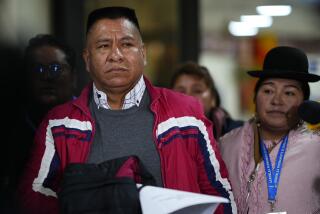Pope Says Mass Under Sao Tome Palms
- Share via
SAO TOME, Sao Tome and Principe — A pretty-as-a-postcard island republic, founded originally on anti-Semitism and slavery, looked past modern trials of AIDS and economic distress Saturday to offer visiting Pope John Paul II a rhythmic popular welcome.
“Hallelujah, hallelujah!” sang a choir as the Pope celebrated Mass under swaying palms by the sea.
For John Paul, the daylong visit to Sao Tome and Principe, the two-island nation of 120,000 people about 160 miles off the coast of west-central Africa, was a relaxed and melodic respite from the rigors of war-torn Angola.
The two islands of Sao Tome and Principe, with a total area of 372 square miles, were first systematically settled in 1493 when 2,000 forcibly baptized children of Jews expelled from Spain were brought here by the Portuguese.
For many years, Sao Tome was a major staging area for slaves en route to North and South America after capture in what is now Nigeria, Gabon, Congo and Angola.
John Paul recalled the islands’ unsavory history in impromptu remarks at the outdoor seaside Mass that drew a modest but enthusiastic sampling of this capital city’s 35,000 people.
“This island witnessed the sad phenomenon of the slave trade. . . . I can only once again deplore here this cruel offense to the dignity of the African people,” the Pope said.
“These sufferings of the past bring me closer in love and solidarity with the people of Sao Tome. May harmony grow in this beloved nation, and may its way be lit with the message of Christ,” the Pope prayed.
Addressing worshipers on islands where half the population is under age 25, John Paul called the family “the fundamental moral force of society.”
“Don’t let peer pressures or propaganda drive you away from the responsibility of forming a true Christian family at home,” the Pope urged in his Portuguese-language homily.
A magnet for pirate attack in the colonial era, Sao Tome traded slaves and sugar under Dutch and French as well as Portuguese rule.
It became independent from Portugal in 1975, and for 16 years it was an isolated Marxist outpost of fishing, tropical agriculture and fledgling tourism with a per capita income of less than $400 a year.
One-party rule with strong Soviet and Cuban influence did not long survive the collapse of the Berlin Wall.
President Miguel Trovoada, elected in 1991 in his nation’s first free vote, boasted to the Pope on Saturday of the change to a pluralistic society.
Sweeping reforms are promised, but they are stalked by old economic crisis and a specter of newly arrived AIDS.
At least three people have recently died of AIDS, and 300 more are infected with the AIDS virus, according to island health officials.
On the eve of the papal visit, Trovoada named former Finance Minister Norberto Costa Alegre to form a new government and direct an economic recovery plan.
Like many of the formerly Marxist countries in Africa, Sao Tome and Principe is now seeking to restructure its economy with the aid of the International Monetary Fund. The government seeks to privatize state firms, speed up agricultural reform, and improve health and education.
John Paul returned to Angola on Saturday night. Today, he stages the biggest popular event of his weeklong visit to Africa with a giant outdoor Mass in Luanda, the Angolan capital. The Pope returns to Rome on Wednesday.
More to Read
Sign up for Essential California
The most important California stories and recommendations in your inbox every morning.
You may occasionally receive promotional content from the Los Angeles Times.










